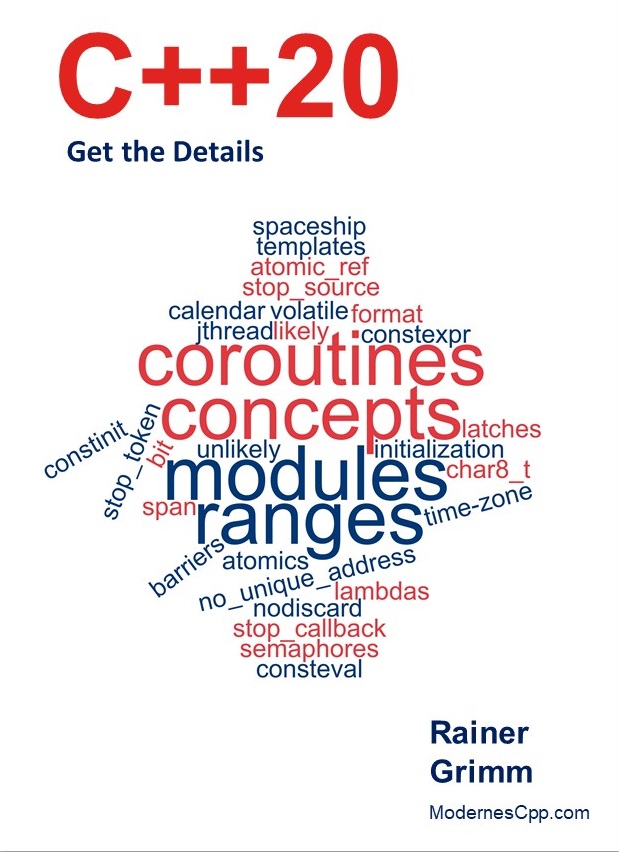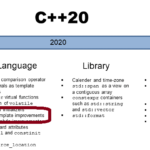I’m Proud to Present my New Book: C++20
I’m proud to present the early release of my book to C++20 on LeanPub. The book is 50 % done and has more than 300 pages and 150 code examples of content. I will update the book at least two times in 2021. Of course, you will get each update of the book.
How to Get it?
Use the link: Leanpub.com: C++20
What’s Inside?
My book C++20 is both: a tutorial and a reference to the C++20 standard. It teaches you C++20 and provides you with the details of this new thrilling C++ standard. The thrilling factor is mainly due to the big four of C++20.
- Concepts change the way we think and program templates. They are semantic categories for the template parameters. They enable you to express your intention directly in the type of system. If something goes wrong, you get a clear error message.
- The new ranges library enables it to perform algorithms directly on the container, compose the algorithm with the pipe symbol, and apply them onto infinite data streams.
- Thanks to coroutines asynchronous programming in C++ becomes mainstream. Coroutines are the base for cooperative tasks, event loops, infinite data streams, or pipelines.
- Modules overcome the restrictions of header files. They promise a lot. For example, the separation of header and source files becomes as obsolete as the preprocessor. In the end, we have faster built time and an easier way to build packages.
More Details
- Core Language
- Concepts
- Two Wrong Approaches
- Advantages of Concepts
- Usage of Concepts
- Unconstrained Placeholders and Constrained Placeholders
- Abbreviated Function Templates
- Predefined Concepts
- Define Concepts
- Application
- Moduls
- Why do we need modules?
- Advantages
- A First Example
- Compilation and Use
- Modularized Standard Library
- Export
- Guidelines for a Module Structure
- Module Interface Unit and Module Implementation Unit
- Submodules and Module Partitions
- Templates in Modules
- Module Linkage
- Header Units
- Three-Way Comparison Operator
- Ordering before C++20
- Ordering since C++20
- The Compiler-Generated Spaceship Operator
- Rewriting Expressions
- User-Defined and Auto-Generated Comparison Operators
- Designated Initialization
- Aggregate Initialization
- Designated Initialization
constevalandconstintconstevalconstinit- Function Execution
- Variable Initialization
- Solving the Static Initialization Order Fiasco
- Template Improvements
- Conditionally Explicit Constructor
- Non-Type Template Parameters
- Lambda Improvements
- Template Parameter for Lambdas
- Detection of the Implicitly Copy of the
thisPointer - Lambdas in an Unevaluted Context and Stateless Lambdas can be Default-Constructed and Copy-Assigned
- New Attributes
[[nodiscard("reason")]][[likely]]and[[unlikely]][[no_unique_address]]
volatile- Further Improvements
- Range-base for-loop with Initializers
- Virtual
constexprfunction - The new Character Type of UTF-8 Strings:
char8_t usingenumin Local Scopes- Default Member Initializers for Bit Fields
- Concepts
- Standard Library
- Ranges Library
- The Concepts Ranges and Views
- Direct on the Container
- Function Composition
- Lazy Evaluation
- A Flavor of Python
std::span- Create a
std::spanfrom a Pointer and a Size - Modifying the Referenced Objects
- Addressing its Elements
- Create a
- Container Improvements
constexprContainer and Algorithmsstd::array- Consistent Container Erasure
containsfor Associative Containers- String prefix and suffix checking
- Arithmetic Utilities
- Safe Comparison of Integrals
- Mathematical Constants
- Midpoint and Linear Interpolation
- Bit Manipulation
- Calendar and Time-Zone
- Time of day
- Calendar Dates
- Time-Zones
- Formatting Library
- Format String
- User-Defined Types
- Further Improvements
- std::bind_front
std::is_constant_evaluatedstd::source_location
- Ranges Library
- Concurrency
- Coroutines
- A Generator Function
- Details
- The Framework
- Atomics
std::atomic_ref- Atomic Smart Pointer
std::atomic_flagExtensionsstd::atomicExtensions
- Semaphores
- Latches and Barriers
std::latchstd::barrier
- Cooperatively Interruption
std::stop_token,std::stop_source, andstd::stop_callback
std::jthread- Automatically Joining
- Interrupt a
std::jthread
- Synchronized Outputstreams
- Coroutines
- C++23 and Beyond
- Coroutines Library
- Modularized Standandard Library for Modules
- Executors
- Network Library
- Contracts
- Reflection
- Pattern Matching
State of the Book
Early Publishing
Although the book is only 50 % done, I publish it at LeanPub. I will update the book at least two times and assume that I’m done with the book in about a year. I decided to publish it half-done because it provides valuable information even in this early stage.
Further Updates
You can expect the following improvements with future updates.
- More code examples when missing C++20 features are available. Additionally, I reimplement existing examples using the C++20 standard and not prototype libraries such as fmt or date.
- More details on the C++20 features.
- A preview of the new C++23 standard.
- Tutorials to the big four at least: concepts, ranges, modules, and coroutines.
How to Contact Me?
- If you have any questions to the book, please contact me: Rainer.Grimm@ModernesCpp.de.
Modernes C++,

 Modernes C++ Mentoring
Modernes C++ Mentoring
Do you want to stay informed: Subscribe.
Thanks a lot to my Patreon Supporters: Matt Braun, Roman Postanciuc, Tobias Zindl, G Prvulovic, Reinhold Dröge, Abernitzke, Frank Grimm, Sakib, Broeserl, António Pina, Sergey Agafyin, Андрей Бурмистров, Jake, GS, Lawton Shoemake, Jozo Leko, John Breland, Venkat Nandam, Jose Francisco, Douglas Tinkham, Kuchlong Kuchlong, Robert Blanch, Truels Wissneth, Mario Luoni, Friedrich Huber, lennonli, Pramod Tikare Muralidhara, Peter Ware, Daniel Hufschläger, Alessandro Pezzato, Bob Perry, Satish Vangipuram, Andi Ireland, Richard Ohnemus, Michael Dunsky, Leo Goodstadt, John Wiederhirn, Yacob Cohen-Arazi, Florian Tischler, Robin Furness, Michael Young, Holger Detering, Bernd Mühlhaus, Stephen Kelley, Kyle Dean, Tusar Palauri, Juan Dent, George Liao, Daniel Ceperley, Jon T Hess, Stephen Totten, Wolfgang Fütterer, Matthias Grün, Ben Atakora, Ann Shatoff, Rob North, Bhavith C Achar, Marco Parri Empoli, Philipp Lenk, Charles-Jianye Chen, Keith Jeffery, Matt Godbolt, Honey Sukesan, bruce_lee_wayne, Silviu Ardelean, schnapper79, Seeker, and Sundareswaran Senthilvel.
Thanks, in particular, to Jon Hess, Lakshman, Christian Wittenhorst, Sherhy Pyton, Dendi Suhubdy, Sudhakar Belagurusamy, Richard Sargeant, Rusty Fleming, John Nebel, Mipko, Alicja Kaminska, Slavko Radman, and David Poole.
| My special thanks to Embarcadero |  |
| My special thanks to PVS-Studio |  |
| My special thanks to Tipi.build |  |
| My special thanks to Take Up Code |  |
| My special thanks to SHAVEDYAKS |  |
Modernes C++ GmbH
Modernes C++ Mentoring (English)
Rainer Grimm
Yalovastraße 20
72108 Rottenburg
Mail: schulung@ModernesCpp.de
Mentoring: www.ModernesCpp.org




Leave a Reply
Want to join the discussion?Feel free to contribute!